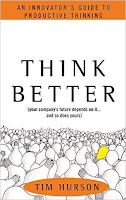Think better
In developing new skills, the major challenge is to make them stick.
The word /training/ has lost its meaning because it's now referred as information transfer rather than skill development. The fact is that you can't train someone in a day. You can teach someone something but you can't train them. Training is about a behavioral change.
Behavioral change requires the forging of new synaptic connection (new neuron pathways).
Entraining in chemistry means to suspend particles in a solution and carry them along. The concept is an apt metaphor for skill development in trying to trap our newly learning in our way of being.
Four requirements for entraining new skillsets.
1. Proof
Apply to test proof the result.
2. Approbation : approval or praise.
An official sanction rather than a passing nod.
3. Language
The words we use have a powerful transformative influence on the way we act and think.
4. Practice
Productive thinking is no different from any other skills that musicians, runners and chess players practice to gain mastery.
No matter how well developed a behavior is, human beings are subjected to a stimulus and response. Unless you continue to reinforce it, it will die. You never truely finish developing something.
A great danger is the naive notion that we can learning something and then change everything overnight. We tend to over estimate what we can do in the short-term and under estimate what we can do in the long-term.
In general, our minds is at tension between exploration and exploitation. When we are exploratory, we attend to things with a wide scope, curious and desiring to learn. Other times, we rely on, or “exploit,” what we already know, leaning on our expectations, trusting the comfort of a predictable environment.
Findings suggest that innovative thinking, not routine ideation, is our default cognitive mode when our minds are clear. Experiments suggest that the mind’s natural tendency is to explore and to favor novelty, but when occupied it looks for the most familiar and inevitably least interesting solution. It seems that with a high mental load, you need more time to generate even a conventional thought.
The capacity for original and creative thinking is markedly stymied by stray thoughts, obsessive ruminations and other forms of “mental load.”
Honing an ability to unburden the load on your mind, be it through meditation or some other practice, can bring with it a wonderfully magnified experience of the world.
Obsessive rumination - It is a preoccupation with perceived mistakes, losses, slights, actions taken or not taken, opportunities forever lost. The feelings associated with obsessive rumination are guilt, regret, anger and envy.
Learning excerpts on how to 'Think Better'.
References :
1. Hurson, T., 2012. Think Better. McGraw-Hill Education.
2. Nytimes.com. 2021. Opinion | Think Less, Think Better (Published 2016). [online] Available at: <https://www.nytimes.com/2016/06/19/opinion/sunday/think-less-think-better.html> [Accessed 23 March 2021].

Comments
Post a Comment